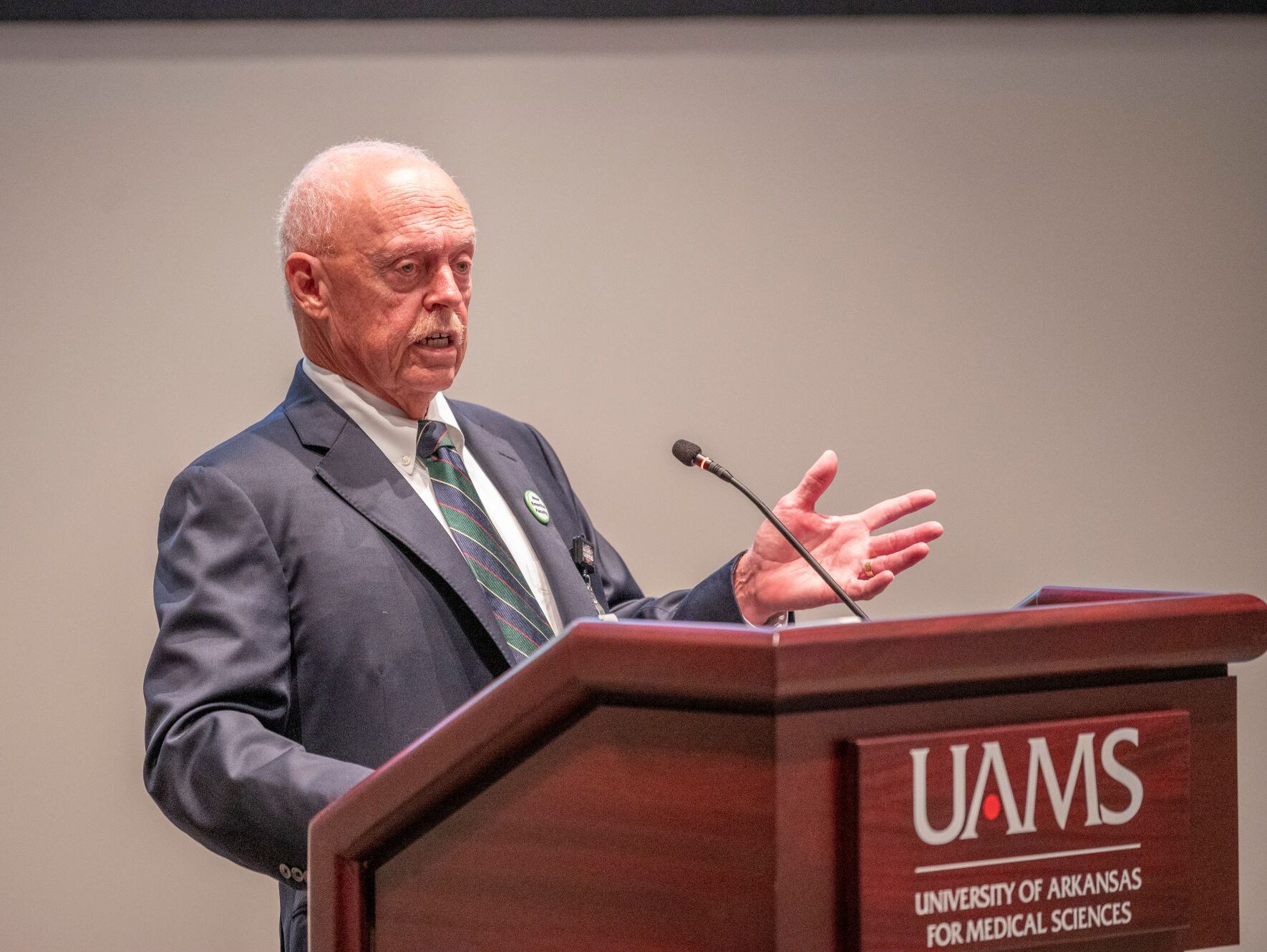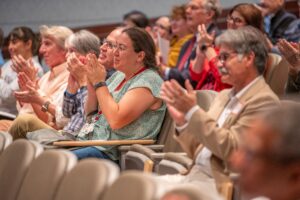View Larger Image

Michael Jennings, Ph.D., the UAMS Emeritus Society’s 2024 “Last Lecture” honoree, discusses one of the “lessons” he has learned over his life and career as a scientist, educator and leader.
Image by Bryan Clifton
UAMS’ Michael Jennings, Ph.D., Shares Words of Wisdom on Teaching, Tomatoes and More at ‘Last Lecture’
| Michael Jennings, Ph.D., has gleaned valuable lessons about science, education, leadership and more over his lifetime and many decades as a biophysicist, faculty member and department chair. His wealth of experiences has taught him many things — including the joy of growing tomatoes.
“There’s just something about tomatoes,” Jennings said as the 2024 honoree in the University of Arkansas for Medical Sciences (UAMS) Emeritus Society’s “Last Lecture: Lessons from a Lifetime of Learning” series. “You get emotional about it.”
Jennings said during the Oct. 10 lecture that his passion for growing tomatoes was first sparked by his father, who was an avid gardener. After his 1995 recruitment to UAMS, Jennings realized it was also a pretty good life lesson. He recalled how the late Robert Barnes, M.D., then-chair of the Department of Surgery, pulled a beautiful, homegrown tomato from his pocket during an inspiring speech to freshmen medical students to illustrate a point about well-being.

Audience members applaud Michael Jennings, Ph.D., for his service and his words of wisdom.Bryan Clifton
“He said to find something you love doing,” Jennings explained.
Jennings served as chair of the Department of Physiology and Biophysics (now Physiology and Cell Biology) from 1995 to 2020. He continued to serve on the faculty until his retirement in June and is now professor emeritus. An award-winning educator, Jennings was instrumental in many initiatives that have shaped current teaching and course structure for medical students and Graduate School students at UAMS.
“Dr. Jennings has, on many occasions, been the stone that caused the ripple, thereby amplifying the effects of his outreach,” Teresita Bellido, Ph.D., said in her introduction of Jennings for his talk. Bellido succeeded Jennings as department chair and nominated him for the Emeritus Society honor. “Dr. Jennings has contributed significantly to the direction and vision of our department, the College of Medicine and the university as a whole,” she said.
Jennings organized his talk as lessons he has learned in the areas of science, education and department leadership as well as general things he picked up along the way, such as “if you can fix it, don’t throw it away,” and “what you think you know may not be true.”
Some of his advice as an educator stemmed from what he said were mistakes early in his teaching career. For example, he said, “education is about learning, not explaining.”
“This is what can happen if you are just explaining stuff to passive learners,” Jennings said while showing a slide with a humorous photo of obviously bored, disengaged students. “About 20 years ago, I finally started shifting focus and working with colleagues toward active learning,” he said.
Jennings received his undergraduate degree in physics from the Massachusetts Institute of Technology and his doctorate in biophysics from Harvard University. He was a research fellow in the biophysics laboratory at Harvard and at the Max Planck Institute for Biophysics in Frankfurt, Germany. He served on the faculty at the University of Iowa for nine years and at the University of Texas Medical Branch in Galveston for eight years before his recruitment to UAMS.
Jennings is internationally known for his research into the mechanisms of ion transport across biological membranes. His early work used the red blood cell as a model system, and one of his projects was devoted to developing new approaches to treating sickle cell disease.
In his talk, Jennings discussed how heeding the advice of his advisors — and occasionally going in a different direction — led to what became the focus for his scholarly work. He also described how “a confusing result in the lab can be an opportunity” and the value of discerning when to press on after a scientific disappointment and when to “throw in the towel.” To illustrate that “you fail at least as often as you succeed,” he showed a list of projects that didn’t work out — and pointed out that he had to reduce the type size to make them fit on the slide.
Jennings said 25 years as department chair taught him to “push for change, but don’t go too far too fast.” As an example, he said, aggressively pushing for a proposal to merge certain programs in three departments failed miserably. However, he added, “a lot of other changes happened gradually, with a lot of consensus building.”
Early in the lecture, Jennings showed a map of the places he has lived and worked. “Don’t be afraid to relocate,” he said, because you could miss out on opportunities. He returned to the map at the end of his talk, noting that he and his wife, Paula, have lived in Little Rock far longer than any previous location.
“So, the other part of this lesson is, if you find the right place, stick around,” Jennings said. “I found the right place. Thank you very much.”
Jennings has held numerous leadership roles in addition to department chair in the College of Medicine, including executive associate dean for basic sciences in 2014-2016. He is currently on the Friends of the College of Medicine Board of Advisors. Mike and Paula Jennings have served the college through many other volunteer and philanthropic roles. In 2018, they established a scholarship for medical students. Earlier this year, they pledged $1 million in additional support to the scholarship and $1 million to create an endowed chair in the Department of Physiology and Cell Biology.
The UAMS Emeritus Society is an organization of retired UAMS faculty members dedicated to providing ongoing support for UAMS. The society established the annual lecture in 2023 to honor a retired or soon-to-be-retired faculty member and give the UAMS community an opportunity to learn from the honoree’s professional and personal experiences. The event is sponsored by the Jeanne K. Heard Endowment for Faculty Development.